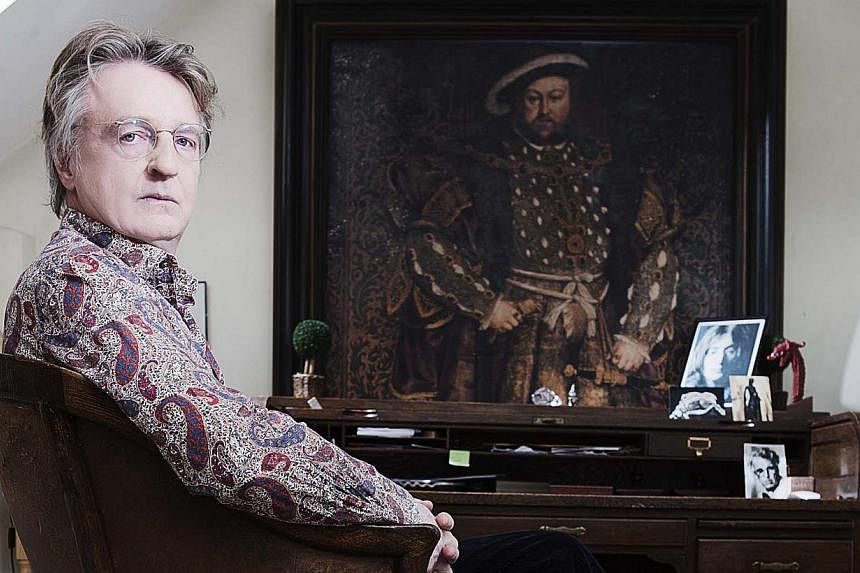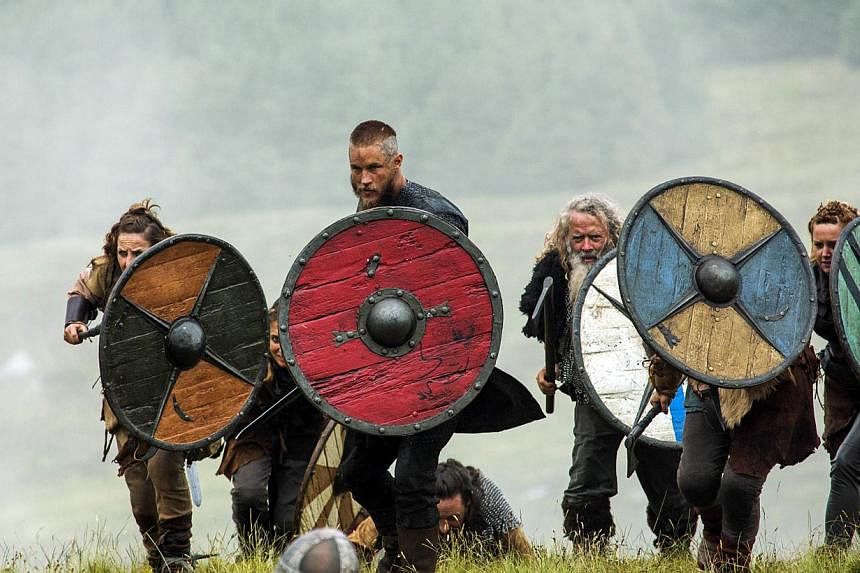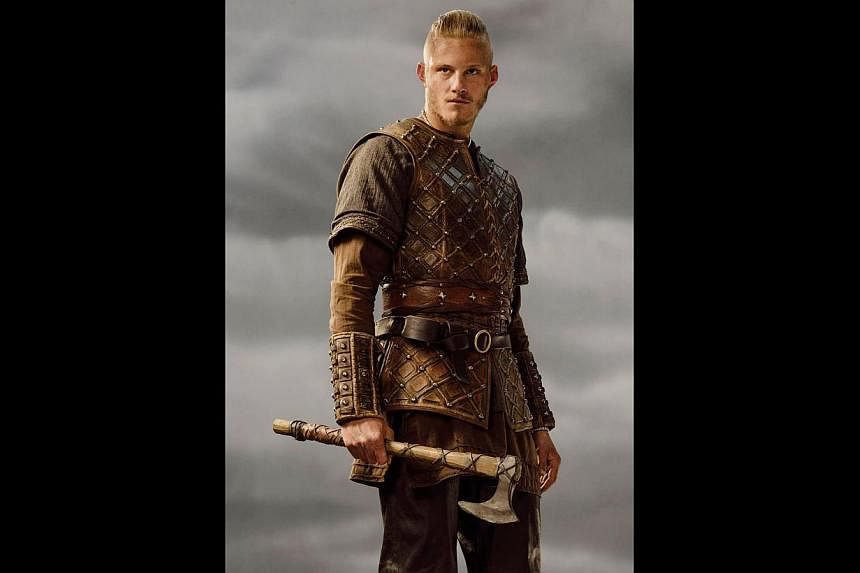When it comes to historical fiction, English screenwriter, producer and showrunner Michael Hirst is probably among Hollywood's top go-to guys.
After he penned the Oscar-nominated film Elizabeth (1998), starring Cate Blanchett, he made a successful transition to the goggle box. He has since been behind several major historical television dramas, from the Emmy-winning The Tudors (2007-2010), starring Jonathan Rhys Meyers, to The Borgias (2011-2013), starring Jeremy Irons.
His latest series Vikings, now into its third season, has become a huge ratings hit on top of being critically acclaimed, drawing an average of 4.3 million viewers an episode in the United States alone.
The show, which is filmed in Ireland, follows the legendary ninth-century Viking chief Ragnar Lothbrok (played by Travis Fimmel), who raids Europe with his equally power-hungry shieldmaiden wife Lagertha (played by Katheryn Winnick).
The series has been nominated for Best Special Visual Effects at the Emmys two years in a row (2013, 2014) and was also up for Best International Drama at both the Canadian Screen Awards and the Gemini Awards.
What is Hirst's blueprint for a successful historical drama? Life! talks to the 62-year-old writer.
It cannot be all about sex and violence
Much of the marketing behind historical TV dramas such as Rome (2005-2007), about Ancient Rome's transition from Republic to Empire, and Spartacus (2010-2013), about the titular Thracian gladiator, focuses on their numerous graphic sex and gory violent scenes.
But Hirst is immediately defensive when asked if history sells only if explicit sex and violence are involved.
He says: "I think TV executives and studios think that's true, but I don't. Audiences want to watch these shows for two reasons - one is that they engage with the characters and the other is that they want to go into that world.
"Historical dramas work when the world is credible and believable. I honestly don't think people watch period dramas such as Game Of Thrones just for the soft porn element."
Having said that, he points out that carnal sex and violence are often part and parcel of many historical periods and so should be featured - as long as they are not done in a gratuitous fashion.
He prides himself on the way nudity and gore are depicted in Vikings, which many TV critics have also noted to be much more subtle than in other epic shows of its kind.
The New York Times wrote: "Mr Hirst demonstrates a moderation that has become rare all across television... He knows that it is possible to convey that lovemaking or an assault is going on without showing every moment of it and every permissible inch of flesh."
Hirst says of the famous "Blood Eagle" episode (Season 2, Episode 7), for example, about a real Viking practice in which Ragnar kills his enemy by slicing open the man's back, taking out his lungs and putting them on his shoulders: "When I first wrote that in, the executives all said we can't show that on TV. But we went ahead and shot it anyway, in our way.
"Ragnar is seen explaining the scene to his sons and then you see the face of anguish of the enemy, the great Jarl Borg. It was a spiritual, extraordinary scene that took us hours to shoot and I didn't feel like it was gratuitous because it was about suffering and redemption."
In fact, trade rag Variety named the scene as one of the most memorable TV scenes of the 2013-2014 season, saying: "It's gruesome, but discreetly handled and the editing, production design and cinematography make the scene oddly beautiful. It's haunting for the right reasons."
The story cannot be told from The Other's perspective
If you are going to do a historical drama, you had better tell the story from the point of view of the people that it is about, says Hirst.
While he has not watched Marco Polo, he surmises from industry talk that the main cause behind its downfall is the fact that it pandered to the Western perspective.
Netflix's recent Marco Polo has been a huge critical flop, despite the hype and the lavish US$90-million (S$123-million) production budget.
Hirst says: "What's interesting to me is telling a story from a fresh point of view. I'm working on a historical Chinese project with Justin Lin, who directed Fast And Furious (2009), and we're going to tell it from a Chinese point of view. So the colonial powers are 'the others'.
"That's the way you should be telling a story about China - it's too obvious to tell it from a Western point of view. Otherwise, you're just getting a caricatured view and no real insight."
"It's like with Vikings - we tell it from the Vikings' point of view and not the British or the French point of view, right?"
He did not share more information about the untitled Chinese project.
You have to be ready to kill characters when necessary
"I love my characters and I hate killing them, but you have to do that sometimes," he says, adding that immense research goes into ensuring that the main story arcs and facts are historically accurate.
"You know, 'blood eagling' Jarl Borg was harder for me than it was for Ragnar. It's difficult, but this is a show called Vikings."
He adds with a laugh: "So you can't think that you can't kill people - though I did get a warning from a militant lesbian group in American recently. They said that they don't care what I do with my male characters, but if I touch female lead Lagertha, I'd better watch out."
Sometimes, being a control freak helps
Hirst is known for writing every single episode of Vikings, considered highly unusual in the television world where show scripts are typically divided among a team of writers across a season.
Says the writer, who also has sole credit for all 38 episodes of The Tudors: "It's not that I haven't found collaborating a pleasure, because I've begun to do it on other projects and if you find the right people, it works.
"But there's something very personal to me about Vikings and I find it hard to imagine other people writing it. It is hard work, I confess. Last season, I was working on six different scripts with three different directors, but I actually enjoyed it."
Perhaps, that is the only way he can ensure the quality is consistently high too.
"I'm not an egomaniac, but I get a buzz out of managing multiple storylines at once and interlacing the stories."
As showrunner of Vikings, he certainly has a lot more power than he used to on the movie set.
He says: "In movies, the director is God. Even if you get along with the director, as I did with Shekhar Kapur on Elizabeth, you're not really wanted on set.
"But in TV, the showrunner is God and you're treated with respect. I love to delegate but, nevertheless, as a writer, to be treated with respect is a very unusual experience for me and I do rather like it."
Follow Yip Wai Yee on Twitter @STyipwaiyee
Vikings Season 3 airs on History (StarHub TV Channel 401) on Fridays at 10pm.




